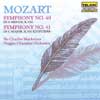Mozart Symphonies Nos. 40 & 41
View record and artist detailsRecord and Artist Details
Composer or Director: Wolfgang Amadeus Mozart
Genre:
Orchestral
Label: Telarc
Magazine Review Date: 5/1987
Media Format: CD or Download
Media Runtime: 75
Mastering:
Stereo
DDD
Catalogue Number: CD80139

Tracks:
| Composition | Artist Credit |
|---|---|
| Symphony No. 40 |
Wolfgang Amadeus Mozart, Composer
Charles Mackerras, Conductor Prague Chamber Orchestra Wolfgang Amadeus Mozart, Composer |
| Symphony No. 41, "Jupiter" |
Wolfgang Amadeus Mozart, Composer
Charles Mackerras, Conductor Prague Chamber Orchestra Wolfgang Amadeus Mozart, Composer |
Author: Edward Greenfield
From the early days of his career Sir Charles Mackerras has been a 'natural' among recording conductors, and here he secures from the brilliant Prague Chamber Orchestra performances of Mozart's last two symphonies which are electrifying in their vitality. Fine as his earlier LP recordings of these symphonies were with the LPO for CfP (CFP40253, 11/76), these sparer, more keenly focused performances carry even greater conviction. As interpretations, though they similarly use chamber forces, they are sharply contrasted with the equally characterful ones from Jeffrey Tate and the ECO (EMI). As a factual point Mackerras unlike Tate observes all repeats. With generally fast tempos—not just in the Minuets, which become crisp country dances, almost scherzos, but in other movements too—Mackerras is able to do that, and still remain within the 75-minutes limit of a CD. The big gain is having the second-half repeat of the finale of the Jupiter, perhaps the most visionary of all Mozart's symphonic inspirations. The scale of argument is more clearly fulfilled with that extra lengthening, though Tate at his marginally more relaxed speed conveys majesty rather than biting urgency.
Mackerras also observes the repeats of both halves in the finale of No. 40, and that too adds to the weight of impact. Where I am less convinced is in having both halves repeated in the slow movement of the G minor. The only previous instance of that I can recall on record was on Benjamin Britten's now deleted Decca LP, one of the most characterfully individual performances ever issued. Though Mackerras makes a sensible choice of Andante, cleaner, faster and less moulded that Tate's, a movement of 13 1/2 minutes does tend to feel long after the compactness of the seven-minute first movement. Tate does not observe either half repeat in that movement.
What is very winning in Mackerras's readings is the crispness and transparency of texture that go with fast speeds—to a surprising degree, when the acoustic is more spacious than that given to Tate. The definition of woodwind lines is immaculate with string textures equally clear, and I am only marginally worried by the East European tone of the bassoon, with a hint of howling in it. Unlike a conductor like Sir Georg Solti, whose fast speeds in Mozart tend to sound too taut, Mackerras never gives an impression of breathlessness, largely thanks to his delicate rhythmic pointing; however hectic the tempo, there is always a spring in the step. Some may still prefer the more relaxed, more lovingly phrased manner of Tate, very characterful and stylish in what might be thought an older style, but Mackerras's fresh, direct manner coupled to superb playing from the Prague Chamber Orchestra makes this a winner of a record too.'
Mackerras also observes the repeats of both halves in the finale of No. 40, and that too adds to the weight of impact. Where I am less convinced is in having both halves repeated in the slow movement of the G minor. The only previous instance of that I can recall on record was on Benjamin Britten's now deleted Decca LP, one of the most characterfully individual performances ever issued. Though Mackerras makes a sensible choice of Andante, cleaner, faster and less moulded that Tate's, a movement of 13 1/2 minutes does tend to feel long after the compactness of the seven-minute first movement. Tate does not observe either half repeat in that movement.
What is very winning in Mackerras's readings is the crispness and transparency of texture that go with fast speeds—to a surprising degree, when the acoustic is more spacious than that given to Tate. The definition of woodwind lines is immaculate with string textures equally clear, and I am only marginally worried by the East European tone of the bassoon, with a hint of howling in it. Unlike a conductor like Sir Georg Solti, whose fast speeds in Mozart tend to sound too taut, Mackerras never gives an impression of breathlessness, largely thanks to his delicate rhythmic pointing; however hectic the tempo, there is always a spring in the step. Some may still prefer the more relaxed, more lovingly phrased manner of Tate, very characterful and stylish in what might be thought an older style, but Mackerras's fresh, direct manner coupled to superb playing from the Prague Chamber Orchestra makes this a winner of a record too.'
Discover the world's largest classical music catalogue with Presto Music.

Gramophone Digital Club
- Digital Edition
- Digital Archive
- Reviews Database
- Full website access
From £8.75 / month
Subscribe
Gramophone Full Club
- Print Edition
- Digital Edition
- Digital Archive
- Reviews Database
- Full website access
From £11.00 / month
Subscribe
If you are a library, university or other organisation that would be interested in an institutional subscription to Gramophone please click here for further information.




